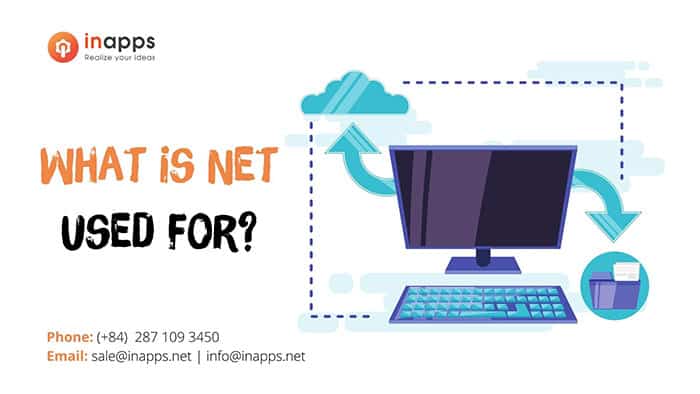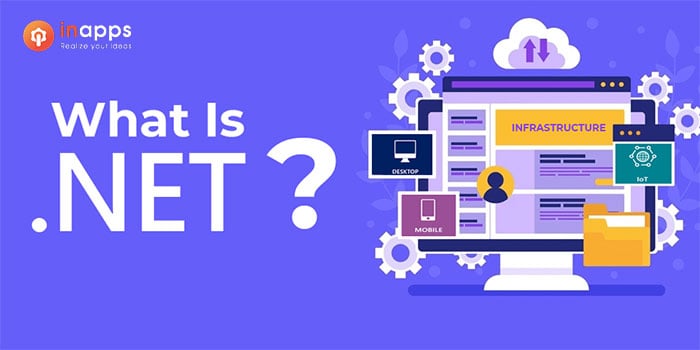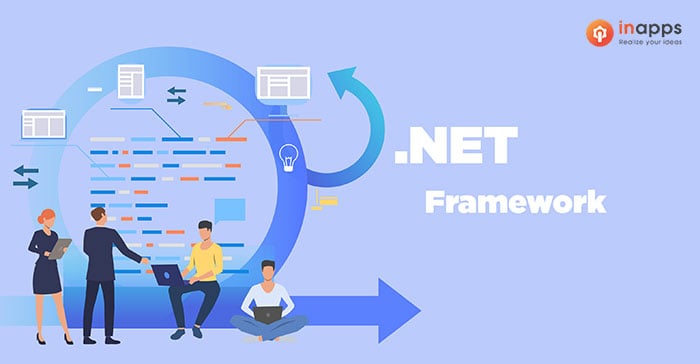In this article, we will take a deeper look at .NET, the .NET Framework, what is .Net used for and what makes .NET technology so important.

What is .net used for?
Key Summary
- Key Features:
- Cross-Platform: Runs on Windows, Linux, and macOS, enabling platform-agnostic apps.
- Open-Source: Managed by the .NET Foundation under MIT License, fostering community contributions.
- Versatile Ecosystem: Includes frameworks (WPF, Windows Forms, ASP.NET), libraries, compilers, and tools like Visual Studio.
- Language Support: Supports C#, F#, Visual Basic for flexible development.
- Layered Architecture: Separates presentation, processing, and data management for agile app development.
- Applications:
- Web and Mobile: ASP.NET for secure, scalable web apps; cross-platform mobile apps.
- Desktop: WPF and Windows Forms for rich Windows desktop applications.
- Gaming: High-performance game development with speed and versatility.
- IoT and Cloud: Supports cloud-native and IoT solutions with robust frameworks.
- Managed Code: Most code is managed, enhancing reliability; supports unmanaged code for external integrations.
- Advantages:
- Visual Studio IDE: Simplifies development with syntax checking and compilation for C#, F#, Visual Basic.
- Cross-Platform: Enables consistent apps across operating systems.
- Open-Source: Large community, extensive libraries, and continuous improvements.
- Object-Oriented: Streamlines development with modular, reusable code.
- Universal Standards: Standardized libraries expand the ecosystem.
- Community Support: Abundant resources, tutorials, and code snippets.
- Disadvantages:
- Licensing: Some Microsoft tools require paid licenses, limiting full open-source adoption.
- Memory Issues: Potential memory leaks and caching problems in complex apps.
- Language Limitation: Supports only C#, F#, Visual Basic, excluding Java, Python, etc.
- Perception: Some view .NET as outdated, though modern iterations counter this.
- .NET vs. Related Tools:
- .NET Framework: Older, Windows-only, closed-source; superseded by .NET.
- Visual Studio: IDE for .NET development, supporting additional languages (e.g., HTML, Python).
- Visual Basic: One of .NET’s supported languages, not the framework itself.
What is .NET?
Microsoft .NET (previously known as .NET Core) is an open-source, cross-platform iteration of the previous .NET Framework released in 2016.
It can be used to create a wide range of applications, including desktop applications, mobile applications, games, web applications, and IoT devices. Because it is open-source, .NET can use many libraries, languages, and editors.
C#, Visual Basic, and F# are all programming languages that can be used to create .NET applications. .NET applications can then be pushed to Windows, Linux, or macOS. Furthermore, .NET has a thriving developer community of thousands of people. With such a vibrant community, there is a vast library of resources for beginners and advanced users.
Many people mix up .NET and Microsoft Visual Studio, and Visual Basic. It’s easy to understand why.
To create applications, .NET and Visual Studio are used in tandem. As a result, a programmer’s first encounter with .NET may occur in the Visual Studio platform.
However, they are not the same thing. .NET is an application development tool used to create applications, but it also includes the ecosystem and infrastructure used to support those applications.

What is the definition of NET?
What is .NET Framework?
The .NET Framework was a previous version of dot NET. It was released in 2002 and only worked on Microsoft Windows to develop Microsoft Windows applications.
The .NET Framework was essentially a framework designed by Microsoft for programming Microsoft Windows applications on Microsoft Windows devices. Services like Microsoft’s K2 have since superseded it.
.NET was not always an open-source project. The .NET Framework was a closed-source solution. However, Microsoft has embraced a more open-source methodology and has opened up many of its platforms since then. The last proprietary version of .NET was the .NET Framework, which was released in 2019.
What is .Net Framework used for?
When it was first developed and released, the .NET Framework provided a standardized software development framework to aid Microsoft Windows development. Today, the .NET product offers an open-source development framework for various channels. The .NET Framework, created by the .NET Foundation and distributed under the MIT License, makes development more accessible, faster, and consistent.
There is a massive ecosystem connected to .NET, which includes:
- WPF is an abbreviation for Windows Presentation (Windows Presentation Foundation). A user-interface design tool for Windows OS and desktop applications.
- Forms in Windows. The .NET Framework GUI Library is a library that can create Windows desktop applications.
- ASP .NET Forms. A web application framework that aids in creating secure and easily accessible web-based applications.

What does .NET Framework do?
Many developers consider the .NET framework a compelling technology, especially since it is open-source. However, it is not to be confused with Visual Studio, even though it is the most visible component of the ecosystem. One significant difference is that Visual Studio supports more languages: HTML, CSS, JavaScript, PHP, and Python.
What is .net used for?
.NET includes several essential components that aid in development:
- Frameworks and libraries for application development.
- Language compilers and runtime components
- Languages such as C#, F#, and Visual Basic are supported.
- Visual Studio is one example of a tool.
Dot NET is a programming language that can be used to create desktop applications, web applications, mobile apps, cloud-native applications, games, and Internet of Things (IoT) devices.
Because of its incredible breadth, asp.NET is in high demand across many industries. A programmer who is good at this framework will be in tall order.
.NET, on the other hand, is merely a framework. To create a finished product with .NET, a developer must be familiar with one of the corresponding languages — C#, F#, or Visual Basic.
The following are some of the essential .Net applications
Architecture
The software architecture of asp. Net is layered. It aids in separating presentation, application processing, and data management functions. It is used in the development of agile applications. It also has the advantage of allowing you to add or edit layers without disrupting the entire application.
Games
Because .Net framework is so versatile, it aids in developing gaming applications. Because of its speed and performance, gaming applications are better developed and last longer.
Applications
It is beneficial in the development of web applications and websites. Applications are mostly created to be used quickly and easily on a computer, laptop, or mobile device with high performance. It aids in the development of a cross-platform-compatible application. Using .Net provides excellent features that enable developers or programmers to create an application compatible with all platforms. It is also used in the development of desktop applications. Because of this, many businesses prefer to work on this open-source platform.
Manageable
Using .Net provides managed code; most code written by developers or programmers is managed code. Unmanaged code is external code written from the Net Framework.
What Are the Pros and Cons of .NET?

Analyze pros and cons of dot NET development
Advantages
Many developers make use of .NET. It’s easy to understand why. There are numerous advantages:
The IDE for Visual Studio
The Visual Studio IDE is a simple development environment that supports C#, F#, and Visual Basic. Developers will quickly identify syntax or grammar issues and compile their programs using the IDE.
Cross-Platform Development
.NET is a proper cross-platform solution because it can be developed for Windows, Linux, or macOS. When used for web apps, .NET can create platform-agnostic applications.
Development that is open-source
When .NET became an open-source solution, it gained a lot of power. As an open-source solution, it has a large community of supporters and has seen many improvements over the years.
Object-Oriented Programming (OOP)
Developers benefit from object-oriented programming because it makes development more accessible, faster, and consistent.
Language assistance
.NET framework is a versatile solution because it can be used by C#, F#, and Visual Basic programmers.
.NET standards that are universal
For many years, .NET standardizations have been baked in – it’s one of the most critical components of the .NET Framework and the .NET system. Universal standards make designing libraries and components for .NET, thereby expanding the .NET ecosystem.
Community Support
The community of dot net is highly supportive. Not only does this imply that documentation is easily accessible, but it also implies that code snippets, lessons, courses, and other resources are available.
Disadvantage
However, this does not imply that the solution is flawless. There are also drawbacks:
Some Requirements for Licensing
The ecosystem as a whole is not open source. Some tools, particularly those released and distributed by Microsoft, necessitate licensing. Through the Microsoft Foundation, Microsoft retains control of the product.
Memory Leaks
.NET has been known to have memory leaks as well as caching issues. Of course, this is a problem in many languages, not just .NET. On the other hand, developers attempting to create lean products may be more inclined to use another language.
Language
.NET does support programming in C#, F#, and Visual Basic, but not all major programming languages. Developers who program in Java or Python, for example, will be unable to program in .NET without learning an entirely new language.
Several developers consider .NET an outdated technology. While accurate for earlier .NET Framework versions, it continues to evolve and thrive as an open-source platform supported by a vibrant community.
How Can You Learn .NET Programming?
C#, F#, and Visual Basic are all programming languages that can be used to create .NET applications.
C#
C# is the most recent iteration of the C programming language line. It is a general-purpose programming language. C is a clear component-oriented programming language; having a C# certification can open many doors for a programmer.
F#
F# is a general-purpose, function-first programming language. F# could be a valuable language for JavaScript programmers who want to learn more about .NET. F# is largely intended to bring functional programming to .NET.
Visual Basic Visual Basic
Microsoft’s flagship programming language is used in many Microsoft development applications. Visual Basic is purposefully designed to be simple to learn and use. Since 1991, it has had a thriving community. However, while it is still in use, it is somewhat deprecated.
C# is most likely the most well-known of these programming languages. It is a versatile and extensible programming language that can be used for almost anything.
After reading this article, we hope you understand what .Net is and what is .Net used for. Follow our Tech News category to learn more exciting information. Or if you need to hire skilled .net developers with reasonable prices for your project? Drop us a line and we’ll be in touch shortly.
Let’s create the next big thing together!
Coming together is a beginning. Keeping together is progress. Working together is success.
















